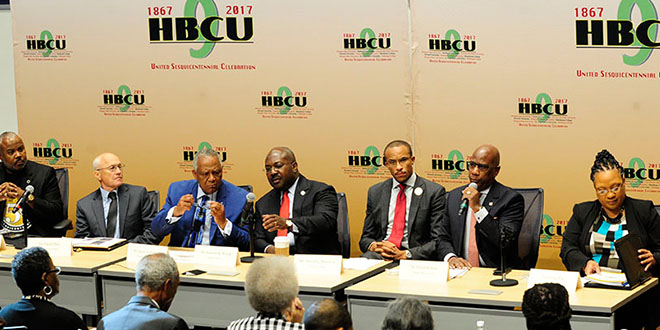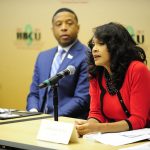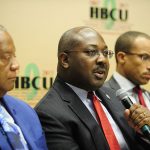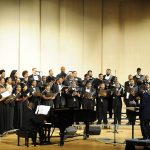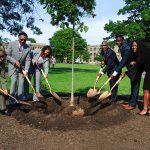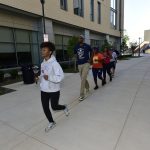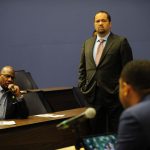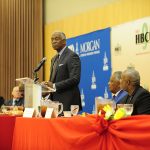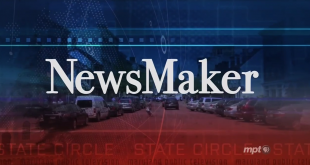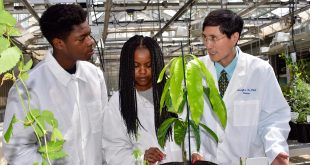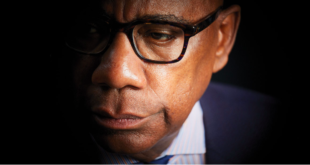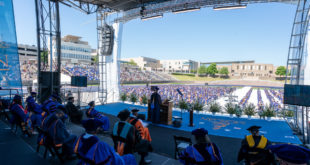Three-Day Event Caps the Combined 150th Anniversary Celebration for Nine Historically Black Institutions
The Year 1867 was momentous in African-American history for a number of reasons, including the events of Reconstruction, the first votes cast by blacks in a state election in the U.S. South and the founding of nine HBCUs, the largest number ever in a single year in the nation’s history. In 2016, those nine institutions — Alabama State University, Barber-Scotia College, Fayetteville State University, Howard University, Johnson C. Smith University, Morehouse College, Morgan State University (MSU), St. Augustine’s University and Talladega College — formed a coalition they named “HBCU-9.” And this past Sept. 28–30, the group hosted a Leadership Summit at Morgan, part of a weeklong HBCU-9 United Sesquicentennial Celebration commemorating the schools’ 150th anniversaries.
The Leadership Summit events on Thursday, Sept. 28 included a Unity Mile Torch Relay on Hillen Road from 33rd Street to Morgan’s Freedom Plaza; an Opening Ceremony at the Plaza; and a Sesquicentennial Choir Concert performed by singers from each of the nine institutions, directed by MSU Choir Director Eric Conway. On Friday, top administrators of seven of the nine schools participated in a Leadership Roundtable Discussion, moderated by veteran White House Correspondent, CNN political analyst and Morgan graduate April Ryan, and a Leadership Fireside Chat, moderated by Pulitzer-Prize-winning journalist and Morgan professor E.R. Shipp. The closing session on Saturday, Sept. 30 featured a panel discussion with African-American higher education advocates on the topic “HBCUs at 150: The State of the Union,” moderated by Benjamin Jealous, former president and CEO of the NAACP.
Parallel activities at the nine schools in the four days preceding the Leadership Summit included the planting of a Sesquicentennial Tree on each campus. Morgan’s Sesquicentennial Tree is located on the Academic Quad in front at McMechen Hall.
Thoughts from the Summit
“Sustainability is the key, but we have to prepare ourselves for the next 150 years…. Sometimes we function in silos, and we have to open ourselves up so that people understand truly what our contributions are.”
— Quinton T. Ross Jr., Ed.D., President, Alabama State University
“One of the things that makes the HBCUs so strong and powerful as a unit is we are able to reach students of all different levels…and try to raise them so that they will fulfill the standards that are required to receive their degree. And that’s costly, as you know. So I think each of us in our role has to be more creative in how we come up with funding to help our students.”
— David Olah, Ph.D., President, Barber-Scotia College
“In positioning (Morgan), I have to be careful to do two things…. I have to constantly keep one eye on the larger, global higher ed space…. And then I have to keep another eye on that which we’re celebrating today: the legacy, the history of the institution.”
— David Wilson, Ed.D., President, Morgan State University
“We come here at a time of urgent need for HBCUs to flourish, not just to maintain the status quo of a black upper middle class that has quadrupled in wealth since Dr. King was assassinated but to pick up the baton and finish the work that was left undone when he was assassinated in the midst of a Poor People’s Campaign.”
— Benjamin Jealous, Former President and CEO, NAACP
“Since 1986, in the last 30 years, HBCUs have produced 1.3 million degrees…. Just imagine where the African-American community would be without those 1.3 million degrees…. There would be a massive chasm in the middle of the African-American community.”
— Brian Bridges, Ph.D., Vice President for Research and Member Engagement, United Negro College Fund
“HBCUs provide a laboratory for learning that is exciting and distinctive that you can’t get anywhere else.”
— Arthur McMahon, Ph.D., Senior Associate Director, White House Initiative on Historically Black Colleges and Universities
 Morgan State University Newsroom Morgan State University
Morgan State University Newsroom Morgan State University
